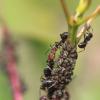Came home from running some errands and checked the Formica pallidefulva incerta nest in my backyard to see if I would find any alates. I did not find alates. I found chaos. In a blur of orange, I managed to identify several of my old friends, mangled and crippled, and at least hundreds of fiery-red, shiny, hooked-tooth tyrants. Polyergus lucidus. I managed to capture some quick videos:
Just thought this was an interesting find. I've never seen Polyergus in my life, and I frankly never thought I would. I just figured they were rare and inconspicuous; I never expected to see a stray worker, let alone a full-on raid, especially not in my backyard!
From what I understand, they raid Formica incerta colonies and steal larvae/pupae that they raise to be slaves? If someone could elaborate on the process, that would be cool. The nest that they returned to (which was a solid 100 ft. away) had other Formica workers surrounding the perimeter that interacted amicably enough with the Polyergus, am I correct to assume these are workers that have already been enslaved?
A quick Google search also revealed that they only raid Formica incerta, so I guess I misidentified the workers in my yard. I wish my loyal F. incerta a speedy recovery. I really like them. ![]()

















